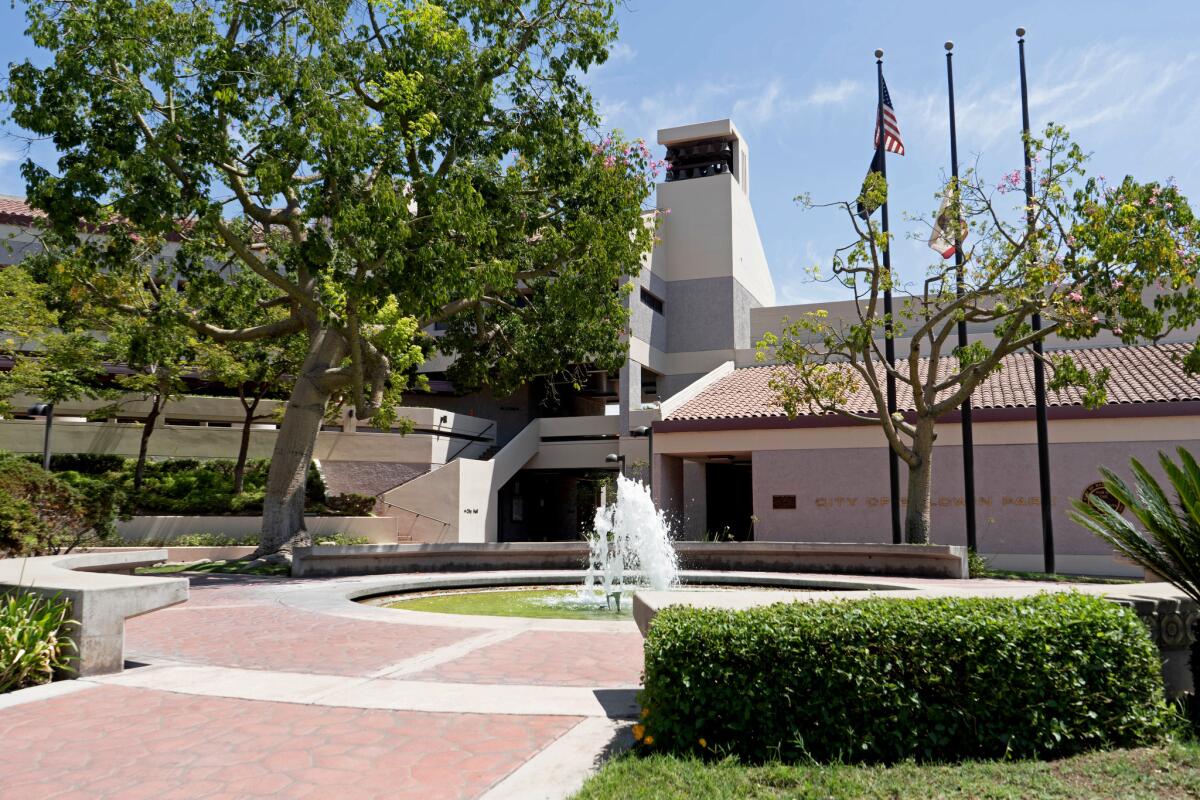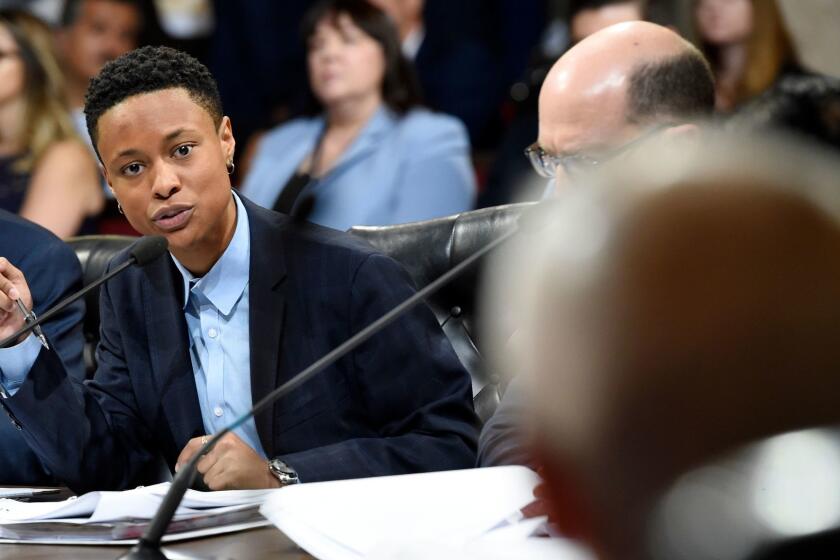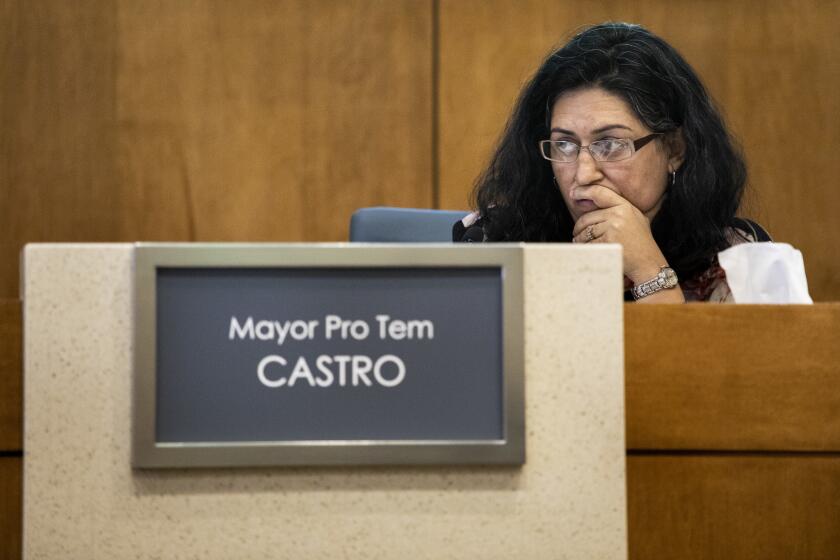FBI raids Compton councilman’s home, Baldwin Park city attorney’s office in pot inquiry

- Share via
FBI agents served search warrants last week at the home of a Compton city councilman and the law offices of the Baldwin Park city attorney, part of a federal investigation examining Baldwin Park’s dealings with cannabis businesses, according to sources familiar with the probe.
An FBI spokeswoman confirmed that the two addresses were among those searched last Wednesday but declined to comment further, saying a judge had sealed the supporting affidavits.
It’s not clear what exactly federal agents are investigating or whether Compton City Councilman Isaac Galvan or Baldwin Park City Atty. Robert Tafoya, whose home and offices, respectively, were searched, are targets. The spokeswoman said neither man has been arrested.
The raids come amid controversy over Baldwin Park’s approval of licenses for cultivation, distribution, manufacturing and testing cannabis.
In September, a former Baldwin Park police officer said in a sworn declaration that he had received complaints from three cannabis operations alleging “questionable business practices, which included paying as much as $250,000 cash in a brown paper bag to city officials.”
The declaration, signed by a retired police lieutenant who had helped oversee regulating cannabis businesses in the city, was filed in defense of a former police chief the city accused of unrelated wrongdoing. The declaration’s allegations about cannabis businesses do not mention Tafoya or Galvan.
One of the sources familiar with the FBI investigation, who is not authorized to discuss an ongoing inquiry publicly and requested anonymity, said federal agents have been interviewing people about allegations that Baldwin Park officials requested illegal payments from cannabis businesses seeking permits in the city.
L.A. is revamping its rules for handing out licenses to cannabis businesses amid anger and disappointment over the tumultuous rollout of the program.
Galvan confirmed that FBI agents searched his apartment. He said the investigation had no connection to Compton city government but would not say if he has cannabis business interests in Baldwin Park. He referred other questions to his attorney, who did not respond to multiple phone calls and emails.
Mark Werksman, an attorney representing Tafoya, said in an emailed statement that his client “is proud of his many years of distinguished service as city attorney of Baldwin Park,” and that it would be inappropriate to “address the specifics of the federal investigation at this time.”
Werksman also said Tafoya “shares the federal government’s interest in rooting out corruption in the cannabis industry and prosecuting political corruption of any kind.
“There is no place for that in our community,” he said in the statement. (Werksman has represented Times journalists in unrelated matters.)
Baldwin Park Mayor Manuel Lozano told The Times that he did not know about the search warrant served at Tafoya’s office in Los Angeles, but that he would address the matter with his council colleagues on Wednesday at their next scheduled public meeting.
Lozano said he knew of no wrongdoing by city officials. Galvan has raised campaign funds for Lozano, he said, and that fundraising was legal.
“Everything that’s done in the city of Baldwin Park, including by me, is above board,” he said.
Few local politicians have championed marijuana as loudly as Aide Castro.
Baldwin Park City Councilwoman Monica Garcia said she also had not heard about the FBI’s search of Tafoya’s law office.
Garcia said she was surprised by the news and had never witnessed anything improper by Tafoya.
“He’s been an effective city attorney for us for seven years,” she said. “I would just say let the authorities investigate and let justice prevail.”
After this article was published online, the city of Baldwin Park issued a statement saying it had not been contacted by FBI agents and noting that Tafoya is not an employee but works for the city on a contract.
“Baldwin Park’s officials recognize the need to continue to be transparent and to maintain public confidence; the City will cooperate fully with federal authorities if necessary,” the statement said.
California voters legalized the possession and sale of recreational cannabis in 2016, but left it up to cities and counties to decide whether they would allow businesses in their jurisdictions to manufacture, distribute and sell cannabis products.
Most cities still prohibit cannabis businesses from operating within their borders, and those that do allow pot operations typically place strict limits on the number of licenses they issue as well as their locations. With permits limited, it is speculated that they could be worth millions of dollars, and competition for them can be fierce.
Baldwin Park officials continued the city’s ban on retail sales of cannabis but decided to allow local manufacturing, distribution and laboratory testing of the drug. City officials began awarding licenses in late 2017, and have said the maximum number of permits they’ll allow is 25.
The city’s approval process erupted in controversy in 2017 after the council granted one business, Rukli Inc., an exclusive permit to distribute cannabis produced in the city. The arrangement prompted a resident and a cannabis business to file a court action alleging that the city was giving Rukli a monopoly over distribution and asking a judge to set aside the contract’s exclusivity provisions. A judge denied their request.
More to Read
Sign up for Essential California
The most important California stories and recommendations in your inbox every morning.
You may occasionally receive promotional content from the Los Angeles Times.

















